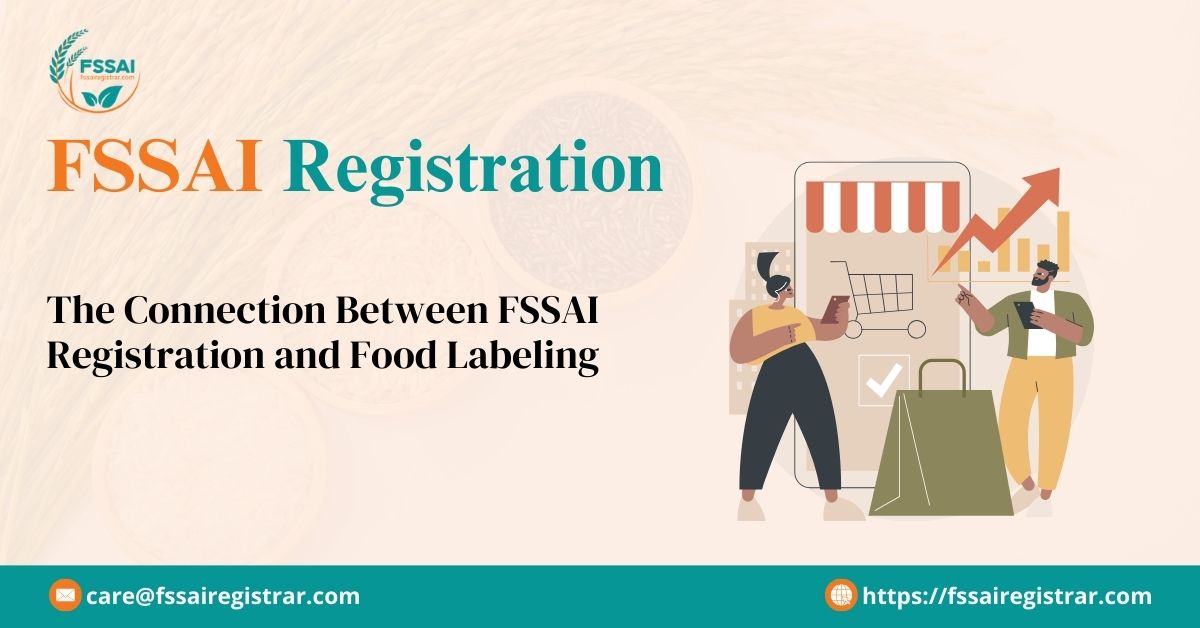In today’s fast-paced world, consumers are becoming more conscious of the food they eat, focusing on safety, nutritional content, and transparency. Food labeling plays a critical role in providing this information, helping consumers make informed decisions. In India, the Food Safety and Standards Authority of India (FSSAI) governs both food safety and food labeling. FSSAI registration is not just a regulatory requirement for food businesses; it also lays the foundation for transparent and accurate food labeling. Together, FSSAI registration and food labeling help maintain food quality and ensure consumer safety, while enhancing brand trust.
What is FSSAI Registration?
The FSSAI (Food Safety and Standards Authority of India) is the regulatory body that oversees food safety standards in India. Any business involved in the manufacture, processing, storage, distribution, or sale of food products must obtain FSSAI registration or a license, depending on the scale and nature of their business. This registration signifies that the business complies with the safety standards established under the Food Safety and Standards Act, 2006.
Once registered, food businesses are obligated to follow FSSAI guidelines, including those related to food labeling, which ensures that consumers have access to accurate information about the food they consume.
Importance of Food Labeling
Food labeling refers to the information provided on food packages about the product, including its ingredients, nutritional content, manufacturer details, and expiration date. Labels act as a source of communication between the food producer and the consumer, offering transparency about the product’s quality, nutritional value, and safety.
Proper food labeling benefits both businesses and consumers by:
- Enabling consumers to make informed decisions about the food they purchase.
- Offering transparency regarding ingredients, allergens, and nutritional values.
- Building trust between brands and consumers by ensuring the products meet regulatory standards.
- Helping businesses comply with food safety regulations, thus avoiding legal and financial penalties.
How FSSAI Registration Influences Food Labeling
FSSAI registration is more than just a business license. It ensures that food businesses adhere to certain safety protocols, one of which is the proper labeling of food products. The connection between FSSAI registration and food labeling can be understood through the following key areas:
Mandatory Labeling Information
Once a food business is registered with FSSAI, it is required to comply with the mandatory food labeling standards set forth by the authority. According to FSSAI, food labels must include the following information:
- FSSAI Logo and License Number: Every food product must display the FSSAI logo and the 14-digit license number, which helps consumers verify that the product is produced by a registered entity following safety standards. This fosters trust in the brand and the food product.
- Name of the Product: The label must clearly state the name of the product, ensuring it matches what the product contains.
- Ingredients List: All ingredients used in the preparation of the product must be listed in descending order of weight, including any additives or preservatives. This is particularly important for consumers with dietary restrictions or allergies.
- Nutritional Information: Labels must provide details about the nutritional content of the product, including calories, fat, carbohydrates, protein, and other essential nutrients per serving. This allows consumers to make health-conscious decisions.
- Manufacturer Information: The distributor, packer, or manufacturer’s name and address must be mentioned. This makes it easier for consumers to trace the product’s origin and verify its authenticity.
- Expiry Date and Storage Conditions: The “Best Before” or “Use By” date must be mentioned, helping consumers understand the shelf life of the product. Additionally, any specific storage instructions should be provided to ensure the product remains safe for consumption.
- Allergen Information: If the product contains common allergens such as nuts, gluten, or dairy, this must be indicated on the label to inform consumers of potential risks.
Ensuring Food Safety and Quality
FSSAI registration guarantees that the food business adheres to high standards of hygiene and safety, which must be reflected in the labeling of food products. Misleading or false labeling can result in serious legal consequences for businesses. For instance, the misrepresentation of ingredients, nutritional claims, or allergen information can harm consumers and damage the business’s reputation.
With FSSAI registration, businesses are required to undergo regular inspections and audits to ensure they maintain food safety standards. This drives businesses to be more transparent in their labeling practices, ensuring that the information provided to consumers is accurate and up-to-date.
Consumer Awareness and Trust
In recent years, FSSAI has taken significant steps to educate consumers about the importance of checking food labels before purchasing products. Campaigns like “Eat Right India” emphasize the value of reading labels for nutritional information, allergen warnings, and safety certifications such as the FSSAI logo.
When a product carries the FSSAI logo and license number, it reassures consumers that the food has undergone rigorous safety checks and complies with national standards. This builds consumer trust, making it more likely for them to purchase FSSAI-registered products over unregistered alternatives.
Standardization of Labels Across the Industry
FSSAI registration ensures a level of standardization in the food labeling process across the industry. Businesses, whether large corporations or small-scale vendors, must follow the same guidelines for food labeling, ensuring consistency and clarity. This makes it easier for consumers to interpret labels and compare different products based on the same set of standards.
Compliance with International Trade
For businesses looking to export food products, FSSAI registration is crucial. Proper labeling in compliance with FSSAI standards not only meets domestic requirements but also aligns with international food safety norms. Many countries require detailed labeling for imported food products, and FSSAI registration ensures that Indian exporters are well-equipped to meet these global standards.
NOTE: APPLY FOR TATKAL FSSAI REGISTRATION
Conclusion
The connection between FSSAI registration and food labeling is vital for maintaining food safety, ensuring transparency, and fostering consumer trust. FSSAI registration mandates that food businesses provide accurate and detailed labeling information, allowing consumers to make informed choices about the products they consume. As the food industry grows, proper labeling by FSSAI standards will continue to be a cornerstone of food safety and consumer protection in India. For businesses, adhering to these standards not only ensures compliance but also strengthens their brand’s credibility in the competitive marketplace.



